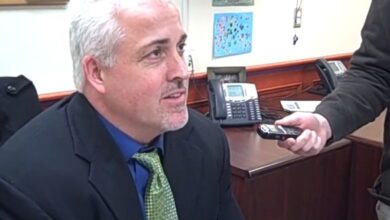Scott Payne: The FBI Agent Who Took Down Extremists and Criminals
An Insight Into the Life and Legacy of Scott Payne’s FBI Career

Table of Contents
ToggleIntroduction
Scott Payne is a name that stands out in the world of law enforcement. With over two decades of experience, Payne’s career has been marked by high-risk undercover operations that infiltrated some of the most dangerous criminal groups in America. From outlaw motorcycle gangs to neo-Nazi organizations, Scott Payne’s work as a Special Agent in the FBI has helped prevent numerous acts of domestic terrorism and organized crime. His life, however, is not just about undercover work. His memoir, Code Name: Pale Horse, reveals the psychological toll of his double life and his incredible dedication to protecting the public. This article will delve into his career, personal life, and the legacy he leaves behind.
Quick Bio
| Attribute | Details |
|---|---|
| Full Name | Scott D. Payne |
| Date of Birth | Exact date not publicly disclosed |
| Place of Birth | South Carolina, USA |
| Age | 50–55 years old (as of 2025) |
| Nationality | American |
| Ethnicity | Caucasian |
| Religion | Christian |
| Height | 6’4″ (193 cm) |
| Weight | Approximately 250 lbs (113 kg) |
| Spouse | Kara Payne |
| Children | Two daughters |
| Career | FBI Special Agent (1998–2021) |
| Notable Work | Infiltrating Outlaws Motorcycle Club, Ku Klux Klan, The Base |
Early Life and Education
Scott Payne was born in South Carolina, where he grew up with a keen interest in law enforcement. His educational journey began at Charleston Southern University, where he earned a Bachelor’s degree in Criminal Justice, supplemented with a minor in Psychology. These fields of study laid the foundation for his later work in the FBI, where he would become known for his strategic thinking and ability to blend in with criminal groups.
Entering the FBI
Payne joined the FBI in 1998, bringing his knowledge of criminal justice and psychology with him. He was quickly placed in field offices across the United States, including New York, San Antonio, and Knoxville. His unique skill set led him to specialize in undercover operations, where he was tasked with infiltrating some of the most notorious criminal organizations in the country. His background in psychology gave him an edge, as he was able to understand the mindset of criminals and navigate the complex relationships within criminal groups.
Career Highlights: Undercover Operations
One of Payne’s most notable undercover assignments involved infiltrating the Outlaws Motorcycle Club in Massachusetts. This dangerous operation required Payne to gain the trust of members of the gang, all while maintaining his cover and collecting vital intelligence on the group’s illegal activities. His work with the Outlaws was just the beginning of a series of high-stakes operations that would define his career.
Infiltrating Extremist Groups
Perhaps the most high-profile of Payne’s undercover operations was his infiltration of the neo-Nazi group, The Base. Under the alias “Pale Horse,” Payne embedded himself within the group and uncovered their violent plans, which included mass shootings and other acts of domestic terrorism. His work here helped prevent these planned attacks, saving countless lives in the process. Payne’s ability to maintain his cover and gather critical intelligence was instrumental in disrupting The Base’s operations and bringing its members to justice.
Embedding with the Ku Klux Klan
Another significant achievement in Payne’s career was his infiltration of the Ku Klux Klan in Alabama. This operation, like others, was dangerous and demanded immense personal sacrifice. Payne’s deep cover work allowed law enforcement agencies to gather essential evidence that led to arrests and convictions, crippling the Klan’s operations in the region.
Psychological Toll of Undercover Work
The psychological toll of living a double life is immense, and Scott Payne’s memoir, Code Name: Pale Horse, offers a glimpse into the mental strain of being undercover. The constant fear of exposure, the moral ambiguity of working with criminals, and the need to compartmentalize one’s life can take a toll on agents. Payne speaks candidly in his book about the emotional and psychological challenges he faced, including the toll his work took on his family life.
Post-FBI Life and Business Ventures
Since retiring from the FBI in 2021, Scott Payne has remained active in the law enforcement and security communities. He is a sought-after speaker, sharing his insights on the complexities of undercover work, extremism, and law enforcement strategy. He also works as a consultant, providing advice and training to law enforcement agencies and private security firms.
Payne has ventured into authorship, with his memoir Code Name: Pale Horse becoming a bestseller. He continues to work in the media, discussing the lessons learned from his career and the future of law enforcement. Payne’s work in the private sector includes consulting for businesses and organizations focused on security and counterterrorism.
Net Worth and Income
Scott Payne’s exact net worth is not publicly disclosed, but it is estimated to be between $500,000 and $1 million. Much of his income comes from book sales, speaking engagements, and consulting work. As a retired FBI Special Agent, Payne’s financial stability has been enhanced by his post-retirement ventures, which include writing, public speaking, and law enforcement consulting.
Legacy and Recognition
Scott Payne’s legacy as an FBI agent is one of bravery, dedication, and perseverance. His work has had a significant impact on national security, particularly in the fight against domestic terrorism and organized crime. Payne’s undercover operations have saved countless lives and helped dismantle dangerous groups that threatened the safety of American citizens.
He is often referred to as the “Hillbilly Donnie Brasco,” a nod to his successful infiltration of criminal organizations. His contributions to law enforcement are recognized not only by the FBI but also by the broader public, who have come to know him through his memoir and media appearances.
Conclusion
Scott Payne’s career is a testament to the sacrifices made by law enforcement agents working in the shadows to protect the public. From infiltrating outlaw motorcycle gangs to exposing violent extremism, Payne’s work has had a lasting impact on national security. His dedication to justice, coupled with his ability to endure the personal challenges of undercover work, ensures that his legacy will be remembered for years to come.
Frequently Asked Questions (FAQs)
Q1: How long did Scott Payne serve in the FBI?
A1: Scott Payne served in the FBI for 23 years, from 1998 to 2021.
Q2: What is Scott Payne’s memoir about?
A2: Payne’s memoir, Code Name: Pale Horse, chronicles his experiences infiltrating extremist groups and outlaw motorcycle gangs, and the psychological toll of living a double life.
Q3: What is Scott Payne’s net worth?
A3: Scott Payne’s net worth is estimated to be between $500,000 and $1 million, primarily from book sales, speaking engagements, and consulting work.
Q4: What did Scott Payne do after retiring from the FBI?
A4: After retiring, Payne became a public speaker, author, and consultant, offering his expertise in law enforcement, counterterrorism, and extremism.
Q5: What is Scott Payne’s legacy?
A5: Payne’s legacy lies in his contributions to disrupting domestic terrorism and organized crime, and his role in saving lives through his undercover operations.



